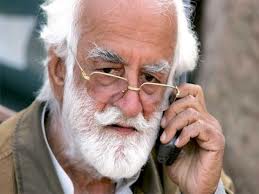
After 9/11, the Musharraf administration’s alliance with the U.S. in the `War on Terror,’ allowed the army to clamp down on a simmering Baloch insurgency with the type of secrecy they used to hunt down Al Qaeda militants. While the Afghan Taliban was left free to operate in Balochistan, the administration made Baloch secessionists disappear under the smokescreen of combating terrorists.
Fuelling Balochistan’s insurgency was the fact that its disarming barren exterior hides rich deposits of minerals, coal and natural gas, which make a significant contribution to the nation’s energy needs. Islamabad’s failure to pay royalties and subsidies to Balochistan and its tight fisted control of the provincial government has fanned the tribal and secessionist movement, which reached a new pitch under Musharraf.
In 2005 when tribal leaders Nawab Akbar Bugti and Khair Baksh Marri mounted an insurgency against Musharraf, the army hunted down and killed their tribal fighters in the mountainous strong holds of Dera Bugti and Kohlu districts. In turn, the militant tribesmen ambushed and killed constabulary from the Frontier Corp, blew up gas pipelines and sabotaged train supplies to the province.
As rocket attacks accelerated, the Musharraf government set up a new military base and camps for army officers along the Sui gas field. The military and Baloch militant nationalists now engaged in a full scale war, backed by missiles and propaganda from both sides. From the government side, the District Coordination Officer Dera Bugti Abdus Samad Lasi told me that the tribal leaders like Nawab Akbar Bugti were responsible for keeping their people poor and backward, even as they used their tribesmen to fight their wars.
Enter a young woman doctor from Karachi, Dr Shazia Khalid, who then worked in Pakistan Petroleum Ltd, which manages the gas fields in Balochistan. Living alone at the company’s onsite hospital, she was woken one night in January 2005 and reportedly raped at gunpoint by an army officer. Despite company directives to stay quiet, she testified against the offending captain.
Shazia’s testimony to the media sent a match through the smoldering Bugti insurgency. Baloch insurgents intensified their attacks on army personnel and blew up gas pipelines, severing gas supply to the rest of the country.
Hustled into exile into London, Shazia spoke to me from her new location. Gen. Musharraf had rejected insinuations that any army man could be involved. However, annoyed by the negative publicity, Pakistan’s officials had arranged for her to go abroad. As she awaited an immigration visa for Canada, Musharraf added insult to injury with his remark quoted in the Washington Post in September 2005: “If you want to go abroad and get a visa for Canada or citizenship and be a millionaire, get yourself raped.” The remark, obviously intended for a victim of rape, hurt the young woman. “It has made me lose hope of receiving any justice in Pakistan,” Shazia told me in a voice muted with pain.
From his hiding place in Dera Bugti, the former governor of Balochistan and tribal chieftan, Nawab Akbar Bugti was livid that Shazia had been raped by an army man – and that he was being protected by the military president. In a voice that shook with anger, he told me that Baloch tribesmen would not rest until Shazia’s rapist was brought to trial. Without waiting to differentiate, he declared, “You in the West may take rape lightly but we in Balochistan consider it a grave human rights violation of women.”
The army used satellite telephones to trace Bugti to an elaborate complex of caves he inhabited in Dera Bugti, where he was killed in a massive army operation.
In the US, where President Musharraf had managed to blur the lines between the terrorism launched by the Taliban and insurgency by Baloch nationalists, Bugti’s murder was lumped with Pakistan’s ongoing war against the Taliban and Al Qaeda. The day after Nawab Akbar Bugti was murdered, an influential US newspaper cited Bugti’s murder as the death of a “terrorist.”
For a while Musharraf’s operation against the Baloch nationalists broke the back of the insurgency. But in death, Bugti became a martyr. It rekindled memories of Balochistan’s forced annexation to Pakistan and further provoked Baloch militants to seek arms and money from other countries in order to secede from the federation.

